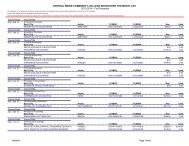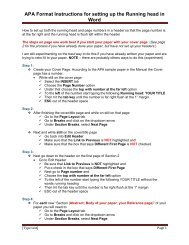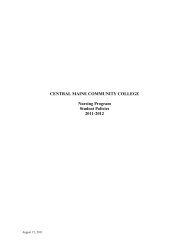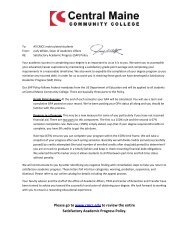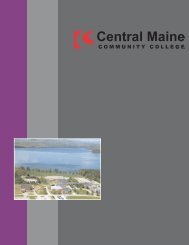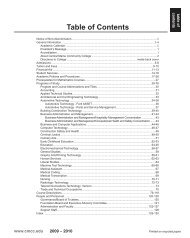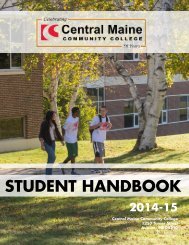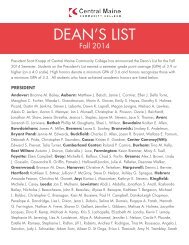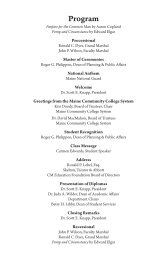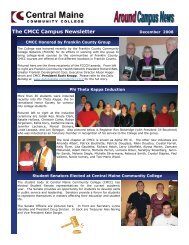Academic Policies and Procedures - Central Maine Community ...
Academic Policies and Procedures - Central Maine Community ...
Academic Policies and Procedures - Central Maine Community ...
You also want an ePaper? Increase the reach of your titles
YUMPU automatically turns print PDFs into web optimized ePapers that Google loves.
Course Descriptions<br />
course<br />
descriptions<br />
theory, ideas, <strong>and</strong> developmentally appropriate<br />
activities learned in ECE 113 to the work at<br />
the practicum site. Interactions that support a<br />
professional relationship between parents <strong>and</strong><br />
early childhood educators will be expected to<br />
be practiced. Each student is responsible for<br />
arranging a schedule (usu ally morning) <strong>and</strong><br />
transportation that will assure the completion of<br />
the required num ber of hours <strong>and</strong> assignments<br />
for this course. Prerequisites: ECE 100 <strong>and</strong> PSY<br />
114; Co-requisite: ECE 113.<br />
ECE 298 Capstone in Early Childhood<br />
Education<br />
6 Credits (2 Lecture 0 Lab 4 Field Experi ence)<br />
14 Hrs/Wk (2 Hrs. Lecture 12 Hrs. Field<br />
Experience) *15 wks<br />
As a fi nal practicum experience, students will<br />
work in an approved early childhood setting<br />
under the supervision of an experi enced professional.<br />
Students will choose the age range<br />
of children for their work, <strong>and</strong> will also attend<br />
seminars with the course instructor to discuss<br />
their experiences <strong>and</strong> professional portfolios.<br />
Evidence of student’s ability to relate theory to<br />
practice must be clear when the instructor visits<br />
the practicum site while the student is working.<br />
The student is responsible for arranging<br />
a schedule <strong>and</strong> transportation that will assure<br />
the completion of the required number of hours<br />
<strong>and</strong> assignments for successfully completing<br />
this course. Prerequisites: All Early Childhood<br />
Courses, except ECE 210 or instructor permission<br />
Economics (ECO)<br />
ECO 201 Introduction to Macroeconomics<br />
3 Credits (3 Lecture 0 Lab 0 Shop)<br />
3 Hrs/Wk (3 Hrs. Lecture) *15 wks<br />
This course is intended to introduce the student<br />
to the macro aspects of the econo my such as<br />
dem<strong>and</strong> <strong>and</strong> supply, national income, unemployment,<br />
infl ation, business cycles, aggressive<br />
spending, fi scal policy, monetary policy, money<br />
<strong>and</strong> banking, economic growth <strong>and</strong> international<br />
trade. This course promotes an underst<strong>and</strong>ing<br />
of the economic environment in which businesses<br />
operate.<br />
ECO 202 Introduction to Microeconomics<br />
3 Credits (3 Lecture 0 Lab 0 Shop)<br />
3 Hrs/Wk (3 Hrs. Lecture) *15 wks<br />
This course is intended to introduce the student<br />
to the analysis of individual mar kets: the functioning<br />
of prices in a market economy, economic<br />
decision making by producers <strong>and</strong> consumers<br />
<strong>and</strong> market structure. Topics discussed include<br />
consumer preferences <strong>and</strong> consumer behavior,<br />
production theory <strong>and</strong> production costs, resource<br />
pricing <strong>and</strong> the monopoly firm. Additional<br />
topics are determined by individual instructors.<br />
Education (EDU)<br />
EDU 101 Introduction to Education<br />
3 Credits (3 Lecture 0 Lab 0 Shop)<br />
3 Hrs/Wk (3 Hrs. Lecture) *15 wks<br />
This survey course will introduce the stu dent to<br />
education in America <strong>and</strong> the basic elements of<br />
its structure. The course will explore education’s<br />
history, examine the role of public education in a<br />
democracy <strong>and</strong> identify current trends affecting<br />
education today. The course will also examine<br />
the relationship between education <strong>and</strong> socie ty<br />
to analyze the impact they have on each other.<br />
The course will emphasize the role of educational<br />
staff in the contemporary schools environment.<br />
EDU 155 Psycho/Social Needs of Students<br />
3 Credits (3 Lecture 0 Lab 0 Shop)<br />
3 Hrs/Wk (3 Hrs. Lecture) *15 wks<br />
This course is designed as an overview of<br />
the psychoemotional <strong>and</strong> social factors that<br />
play a role in the student’s concept of self as<br />
learner. The educational environment will be<br />
viewed through the lenses of the teacher <strong>and</strong><br />
the student, with discussions focused on what<br />
classroom practices work <strong>and</strong> why. Potential<br />
educational problems <strong>and</strong> appro priate interventions<br />
will take center stage. The area of student<br />
aspirations will also be one of the focal points of<br />
the course.<br />
EDU 161 Technology in Education<br />
3 Credits (3 Lecture 0 Lab 0 Shop)<br />
3 Hrs/Wk (3 Hrs. Lecture) *15 wks<br />
This survey course will expose students to the<br />
increasing role of technology in education. It will<br />
explore application of technology in the teaching/<br />
learning process <strong>and</strong> the appropriateness of applied<br />
methodologies. Topical areas to be covered<br />
include adap tive equipment, distance education<br />
<strong>and</strong> internet support of academic outcomes.<br />
EDU 185 Fundamentals of Educating<br />
Students with Special Needs<br />
3 Credits (3 Lecture 0 Lab 0 Shop)<br />
3 Hrs/Wk (3 Hrs. Lecture) *15 wks<br />
This course will survey a variety of special needs<br />
issues including condition syn dromes, common<br />
limitations, mitigation strategies, adaptive equipment<br />
<strong>and</strong> frequently suggested accommodations.<br />
This course examines the fundamentals<br />
of working with students identifi ed as having<br />
special needs <strong>and</strong> includes an overview PL 94-<br />
142 of IDEA <strong>and</strong> 504 guidelines. Stu dents will<br />
study the referral process, evalu ation methodologies,<br />
the PET process, IEP implementation<br />
strategies, transition plans, least restrictive environments,<br />
inclusion <strong>and</strong> other current principles<br />
in the field.<br />
EDU 261 Fundamentals of Literacy<br />
Education<br />
3 Credits (3 Lecture 0 Lab 0 Shop)<br />
3 Hrs/Wk (3 Hrs. Lecture) *15 wks<br />
In this course, students will examine the fundamentals<br />
of literacy <strong>and</strong> explore the ways in<br />
which individuals acquire initial reading skills<br />
<strong>and</strong> underst<strong>and</strong> print across content areas. This<br />
course will also exam ine a variety of pedagogical<br />
models com monly found in literacy education to<br />
familiarize students with st<strong>and</strong>ard practices <strong>and</strong><br />
procedures. Prerequisite: Successful completion<br />
of ENG 101 or registration in ENG 101.<br />
EDU 271 Fundamentals of Mathematics<br />
Education<br />
3 Credits (3 Lecture 0 Lab 0 Shop)<br />
3 Hrs/Wk (3 Hrs. Lecture) *15 wks<br />
This course will provide students with an underst<strong>and</strong>ing<br />
of the foundation for teach ing<br />
mathematics in Pre-Kindergarten to Grade 12.<br />
The six Principles for school mathematics will<br />
be integrated into the five Content St<strong>and</strong>ards<br />
of Number <strong>and</strong> Opera tions, Algebra, Geometry,<br />
Measurement, Data Analysis <strong>and</strong> Probability,<br />
<strong>and</strong> the five Process St<strong>and</strong>ards of Problem<br />
Solving, Reasoning <strong>and</strong> Proof, Communication,<br />
Connections, <strong>and</strong> Representation. Stu dents will<br />
develop activities that promote the underst<strong>and</strong>ing<br />
of the NCTM (National Council of Mathematics)<br />
St<strong>and</strong>ards at the Pre-K to Grade 2, Grades<br />
3 - 5, Grades 6 8, or Grades 9 - 12 level, depending<br />
upon their individual need.<br />
EDU 285 The Theory <strong>and</strong> Practice of<br />
Educational Support<br />
3 Credits (3 Lecture 0 Lab 0 Shop)<br />
3 Hrs/Wk (3 Hrs. Lecture) *15 wks<br />
The capstone seminar is designed for stu dents<br />
to demonstrate their knowledge of educational<br />
practices, policies <strong>and</strong> resources. The students<br />
will learn to use that knowledge in order to analyze<br />
prob lems, synthesize appropriate actions<br />
<strong>and</strong> evaluate the outcomes of those actions.<br />
www.cmcc.edu 2010 ~ 2011 93



